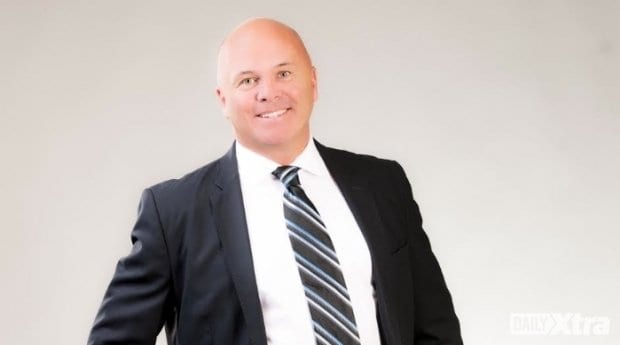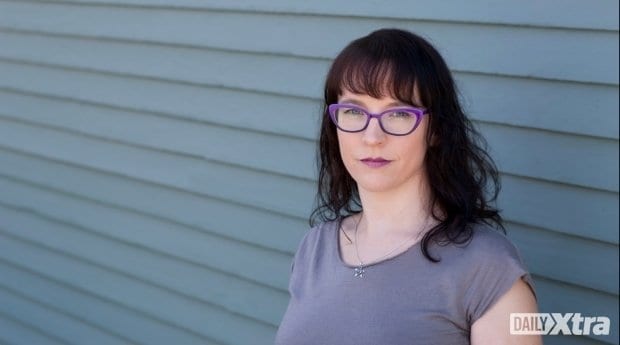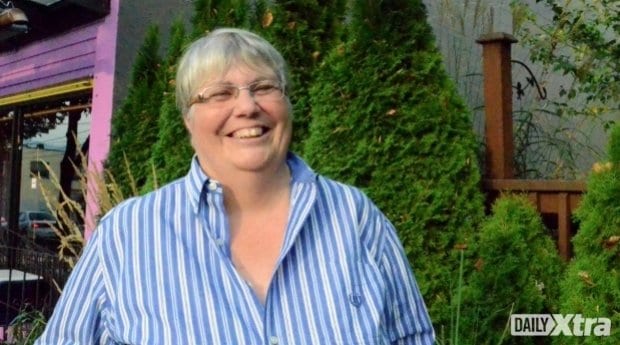
Rob McDowell says the 15 candidates make a “good baseline,” which he hopes will continue to climb next election. Credit: NPAVANCOUVER2014.CA

Trish Kelly points out that Vancouver’s elected municipal bodies actually lost diversity across the board this election. Credit: belle ancell
November’s municipal elections in BC saw 15 openly LGBT candidates running for civic office in Vancouver, Surrey and Mission.
In Vancouver, 11 community members from a variety of parties, including Vision Vancouver, the Non-Partisan Association (NPA), the Green Party, COPE, IDEA and the Public Education Project, ran for a total of 21 seats on city council, park board and school board.
Despite the high number of contenders, only one — Tim Stevenson of Vision Vancouver — won. Gay parks commissioner Trevor Loke lost his seat, cutting in half the total number of municipally elected gay people in Vancouver compared to the last civic election, in 2011.
In Mission, independent candidate Shazad Shah was also unsuccessful in his bid for a seat on city council. But Vera LeFranc made history in Surrey when she became the first openly lesbian city councillor elected to office in the Vancouver suburb.
Gay city council candidate Martin Rooney and trans school board candidate Nicole Joliet did not win seats in Surrey.
Longtime education activist Jane Bouey, who ran for the Vancouver School Board but didn’t win a place among the nine trustees, says the number of openly queer candidates who decided to take the political plunge this year is noteworthy.
“It shows that queer folk are not afraid to run openly as queer in elections. That is a major shift,” she says. “Why the numbers were higher this election than three years ago is hard to say.” She suggests that some of the supportive media coverage of the Vancouver school and park boards’ queer and trans policy work this year may have played a role in motivating people to run.
Still, she finds it upsetting that so few of the community’s candidates were elected. “That to me is sort of worrying in a lot of ways, but it’s hard to know, too, whether that represents any sort of change on the part of the elector or if it just had to do with who was running where, for what party, in this particular election.”
Bouey says she was also struck by the diversity among the out candidates running for civic office. “There was a time when it seemed like the only out folk were gay white men in terms of elections, and that’s clearly shifted.”
Trish Kelly, who won a nomination to run on Vision Vancouver’s park board slate but dropped out because of her sex-positive art and activism, says she found the number of queer candidates promising. She wonders, however, how openly queer some of the candidates really were. Apart from Stevenson, Kelly says, many candidates’ electoral biographies stopped short of explicitly stating their affiliation with the LGBT community.
She says some candidates appeared to assume that people already knew they are queer. She wonders what impact the somewhat implied visibility may have had on electoral outcomes. “We actually lost headcounts as far as queer people being elected in Vancouver.”
There are also fewer people of colour and fewer young people now filling Vancouver’s elected civic seats, she adds, despite there being a lot of discussion about diversity in the leadup to the election. It’s important for parties and for the people elected to foster more diversity, engage marginalized communities, and make space for candidates from the queer community to try again in future elections, she suggests.
Rob McDowell, who ran unsuccessfully for city council with the NPA, says the 15 candidates make a “good baseline,” which he hopes will continue to climb next election.
“The comfort level with people being out as politicians is certainly increasing,” he says. “In the past, we probably had quite a few, but people just weren’t comfortable being out.”
McDowell, who says he’s always been out, says participating in a campaign as a political person was an eye-opener, even within the community. He recalls being approached by a gay pub patron who told him and NPA mayoral candidate Kirk LaPointe that they were not welcome there.
“When we’re pushing the whole diversity thing, and we ourselves are talking about how diversity should be accepted, we shouldn’t be shocked when there’s also a diverse political spectrum to our community as well,” McDowell says. “Nobody should have a lock on the community.”
McDowell, who has been involved with political campaigns in the past, notes there’s a certain loss of image control when candidates’ faces and names go public. He says he was open about his sexuality during the campaign but says it didn’t seem to matter to potential voters. “It was weird how it was such a non-issue, and I like that because I don’t think it should be an issue,” he says.
“I think what being LGBTQ allows is that you understand, perhaps, that sense of vulnerability that certain groups might have,” he continues. “We can’t afford to be completely secure in our environment, and I get that. Every LGBTQ politician brings that to the table.”
McDowell says even in areas outside of the known queer hubs, he didn’t encounter any discrimination on the campaign trail. Still, he’d like to see more cross-party support for aspiring LGBT candidates to “get more of us across the finish line.”
Bouey recalls one queer campaign worker in 1999 warning her to be careful not to become known only as the queer candidate, as it could pose a challenge to advance other policies she might want to champion. “In a lot of ways, the work I did at school board was never recognized as much as it could be in the mainstream society, partly because my political organization at that time didn’t really know how to do the kind of support work Vision was able to do around Tim [Stevenson’s] work or around Trevor Loke’s work at parks board,” she says.
She says she felt more comfortable being out as queer this election than in previous years. She chalks that up to a greater understanding, even within the community, of the continuum of sexual orientation. “That was always a bit of a problem in the past, and I don’t feel that now,” she says. “Now I feel I can say I’m queer, and there’s an understanding of what that means.”
Kelly says pointing out difference can have an impact on a candidate’s chances of getting elected. The political system rewards candidates who are banal and free of any kind of complicated personal history, she says. Still, she encourages queer candidates to come out.
“The reason that it is worthwhile is because if we’re looking for candidates that represent different communities, and we’re looking for candidates that embody diversity, queer candidates have to make the choice about whether or not they’re going to claim that identity in a way that aboriginal candidates, for example, don’t get to choose,” she says. “The baggage that comes along with being from a marginalized community is immediately read when they’re being positioned in the media or someone meets them at an event; they can’t decide not to claim that identity.”
She says those in the position to claim their identity as part of the LGBT community, or other communities where identity is not immediately visible, have a responsibility to make themselves vulnerable and claim that identity.
“It’s a way of being an ally to others who can’t make the choice to not disclose their community of origin or the identities they embody,” Kelly says.


 Why you can trust Xtra
Why you can trust Xtra


